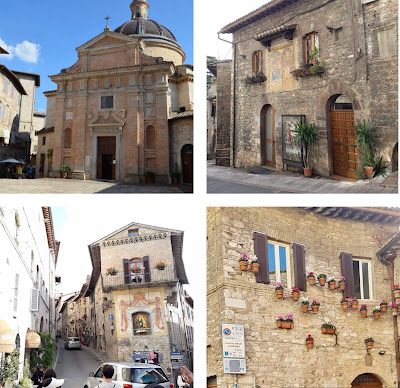 |
Town of Assisi with Rocca Maggiore,
the fortress that has dominated the citadel for 800 years |
In this life, you will meet people who think they’re above you because they’re rich. Snobs who will tell you, “Mahirap mangarap ang mahirap. (It’s hard for poor people to dream.)” With noses up in the air and eyebrows arched, they think only the rich can dream big.
Then, you learn about saints like Francis of Assisi who literally threw away his father’s riches because he wanted to leave his worldly life and live in the service of God and His people.
You get uplifted. You can’t take your wealth with you after all. Our day in Assisi made St. Francis and St. Claire’s call for a life of prayer and simplicity more real to us.
“Men lose all the material things they leave behind them in this world, but they carry with them the reward of their charity and the alms they give. For these, they will receive from the Lord the reward and recompense they deserve.” - St. Francis of Assisi
Our first stop, the Church of Sta. Maria degli Angeli, is the place where St. Francis died.
Enclosed within this papal basilica is a small 9th
century church, the Porziuncola. This is the original church where St. Francis
came to pray and where he gathered his friars to form the Franciscan movement.
%20ctto%20GC.jpeg)
Crucifixion fresco on the backside
of the Porziuncola
Our guide showed us the Roseto (Rose Garden). It is said
this is where the devil tempted St. Francis. To keep himself from succumbing to
temptation, he threw himself naked upon the thorns of the rose bushes. But God
saved him by removing the thorns. That variety of thornless roses grows in the
garden to this day.
The thorns and temptation became a running joke with our
group. Every time one of us gets tempted to enter the quaint shops that lined
the streets of Assisi, we get the threat of being thrown upon the rose bushes.
That kept most of our luggage within the allowed 30 kilos.
We got a relief from those material temptations because at
the end of the road sits the Basilica
di San Francesco d’Assisi (Basilica of Saint Francis of Assisi). It is a Papal
minor basilica and one of the most important places of Christian pilgrimage in
Italy. It has a Lower and Upper Basilica. The Lower Basilica is the oldest
Gothic church in the country.
But, after a lunch of traditional Umbrian cuisine, we all gave in to temptation and rushed off for some shopping for souvenirs, cheese and truffle oil.
Let me just say, I loved Assisi both for its religious
significance and its ambiance. I was especially charmed by the medieval
buildings and quaint shops along its hilly, cobbled streets. Including Assisi
in my must-go-back-to-for-a-more-leisurely-trip list.
The day after our visit to
Assisi, we were off to another site for spiritual enrichment, San Giovanni
Rotondo. This is the home of St. Pio of Pietrelcina from 1916 until his death in 1968.

Official group photo in front of the
Church of Sta. Maria delle Grazie
We were given a guided tour around the Church of Santa Maria delle Grazie, the church built during Padre Pio’s lifetime and the Convent where he lived. We saw many of Padre Pio’s memorabilia including the thousands of letters from all over the
world requesting for prayers from him.
Our tour was made more interesting because our guide and his family are natives of San Giovanni. His grandfather and father worked for the revered saint. He told us many stories of healings and miracles.
At the end of the tour, we joined a long queue to the crypt to view Padre Pio’s well-preserved body that is entombed in a transparent casket.
We were also fortunate to be able to attend mass at the Chiesa San Pio da
Pietrelcina (Padre Pio Pilgrimage Church-Shrine). The church is huge as it can seat 6,500 people with standing room for 30,000 more outside.
After San Giovanni, we went to Lanciano for lunch.
The restaurant looked like it was an old home converted into a family-owned
trattoria. They served us a deliciously authentic Italian meal complete with
gelato for dessert.
But more than feeding our bodies, Lanciano also fed our
souls as we visited the Santuario Del Miracolo Eucaristico at the San
Legonziano Church. This is where the miracle of the host turning into human
flesh happened. For me, it was a validation of our Catholic belief that the
host is truly the body of Christ.
Note: Some photos I included here were taken by my co-pilgrims who had
way more skills in photography than I did. Thank you bros and
sis-sies.










No comments:
Post a Comment